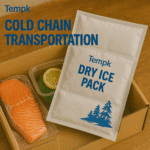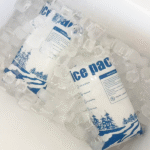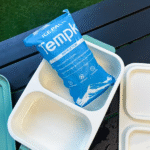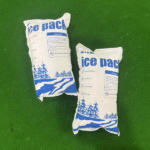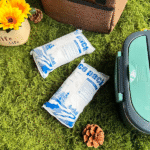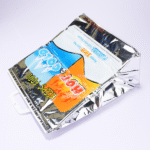Imagina un mensajero que navega por las bulliciosas calles de la ciudad, Velocidad de equilibrio con la necesidad urgente de mantener los perecederos frescos. En este escenario de alto riesgo, mochilas de entrega Ya no son sólo portadores: son salvavidas para preservar la calidad., reduciendo el desperdicio, y satisfacer las crecientes expectativas de los consumidores. A medida que aumenta la demanda mundial de entregas sensibles a la temperatura, Estas soluciones portátiles de cadena de frío están transformando la forma en que las empresas abordan el "desafío de la última milla".,“Asegurar que todo, desde el sushi hasta las vacunas, llegue en perfectas condiciones..
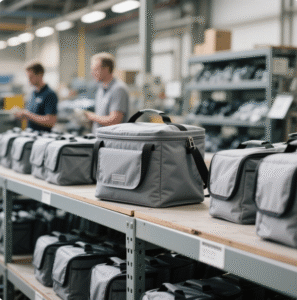
El dilema de la última milla: Por qué son importantes las mochilas de reparto
La industria de la cadena de frío pierde 30% de productos perecederos debido a las fluctuaciones de temperatura durante el transporte, cuesta miles de millones al año23. Los métodos tradicionales, como las furgonetas refrigeradas, consumen mucha energía y son inflexibles para las entregas urbanas., mientras que los envases de un solo uso exacerban el daño ambiental. Las mochilas de reparto abordan estos problemas al:
-
Extendiendo la frescura: El aislamiento avanzado mantiene temperaturas precisas hasta 24 horas, crítico para los productos farmacéuticos (2°C–8°C) y comidas frescas (0°C–5°C)2.
-
Mejorar la movilidad: Ligero, Los diseños ergonómicos permiten a los mensajeros navegar eficientemente en áreas concurridas..
-
Reducir las huellas de carbono: Los materiales reutilizables reducen los residuos plásticos, Alinearse con objetivos globales de sostenibilidad como la prohibición del plástico de la UE.3.
Mochilas Térmicas de Tempk: Donde la tecnología se encuentra con la sostenibilidad
Templ, líder en innovación de la cadena de frío, redefine las mochilas de reparto con su Serie UrbanGuard, Diseñado para brindar agilidad e inteligencia en la logística de última milla.:
1. Rendimiento térmico de grado militar
Característica de las mochilas de Tempk compartimentos revestidos de aerogel y paquetes de gel PCM de base biológica, Estabilización de temperaturas entre -20°C y 50°C.. Las pruebas independientes muestran un 40% Transferencia de calor más lenta en comparación con la espuma EPS tradicional., Garantizar que el helado permanezca congelado y las ensaladas crujientes incluso en el calor del verano.3.
2. Transparencia impulsada por IoT
Los sensores integrados monitorean la temperatura en tiempo real, humedad, y ubicación. Sincronización de datos a aplicaciones móviles, permitiendo a los equipos de logística recibir alertas instantáneas sobre desviaciones, una característica que ha demostrado reducir el deterioro al 25% en ensayos farmacéuticos2. Los clientes pueden escanear códigos QR para ver el recorrido de su entrega, mejorar la confianza y la satisfacción.
3. Diseño ecológico
-
Materiales: Hecho de 100% Plásticos reciclados destinados al océano y revestimientos aprobados por la FDA., cada mochila compensa 12 kg de CO2 al año.
-
Modularidad: Las piezas intercambiables extienden la vida útil del producto por 300%, mientras que un programa de recompra convierte unidades retiradas en materias primas para nuevos productos.3.
4. Personalización ergonómica
-
Compartimentos ajustables: Ajustar pedidos multitemperatura (p.ej., pizza caliente junto con bebidas frías).
-
Flexibilidad de marca: Impresiones resistentes a la decoloración y logotipos resistentes a los rayos UV convierten las mochilas en anuncios móviles, impulsar el recuerdo de la marca mediante 50%2.
-
Sellos a prueba de manipulaciones: Los indicadores que cambian de color garantizan la integridad del paquete, crítico para artículos de alto valor como muestras de laboratorio.
El futuro: Mochilas inteligentes como ventaja competitiva
Dado que se prevé que el mercado de entrega de alimentos llegue $1.5 billones por 2026, dominarán las empresas que prioricen la sostenibilidad y la transparencia. Las mochilas de Tempk permiten a las empresas:
-
Reducir costos: Guardar diseños reutilizables $1,000+ anualmente por mensajería en comparación con las opciones desechables.
-
Cumplir globalmente: Cumpla con las regulaciones de la FDA y la OMS sin esfuerzo con registros de temperatura listos para auditorías.
-
Impulsar el compromiso: Los diseños aptos para Instagram y el seguimiento en tiempo real generan 3 veces más menciones en las redes sociales23.
Conclusión
Las mochilas de reparto ya no son accesorios sino herramientas esenciales para ser resilientes, cadenas de frio ecologicas. La serie UrbanGuard de Tempk ejemplifica este cambio, fusionando tecnología de punta con gestión ambiental. A medida que se intensifican los desafíos climáticos y las demandas de los consumidores, Adoptar este tipo de innovaciones no es sólo una logística inteligente: es un compromiso de ofrecer frescura, sostenibilidad, y confiar en cada paso.
















